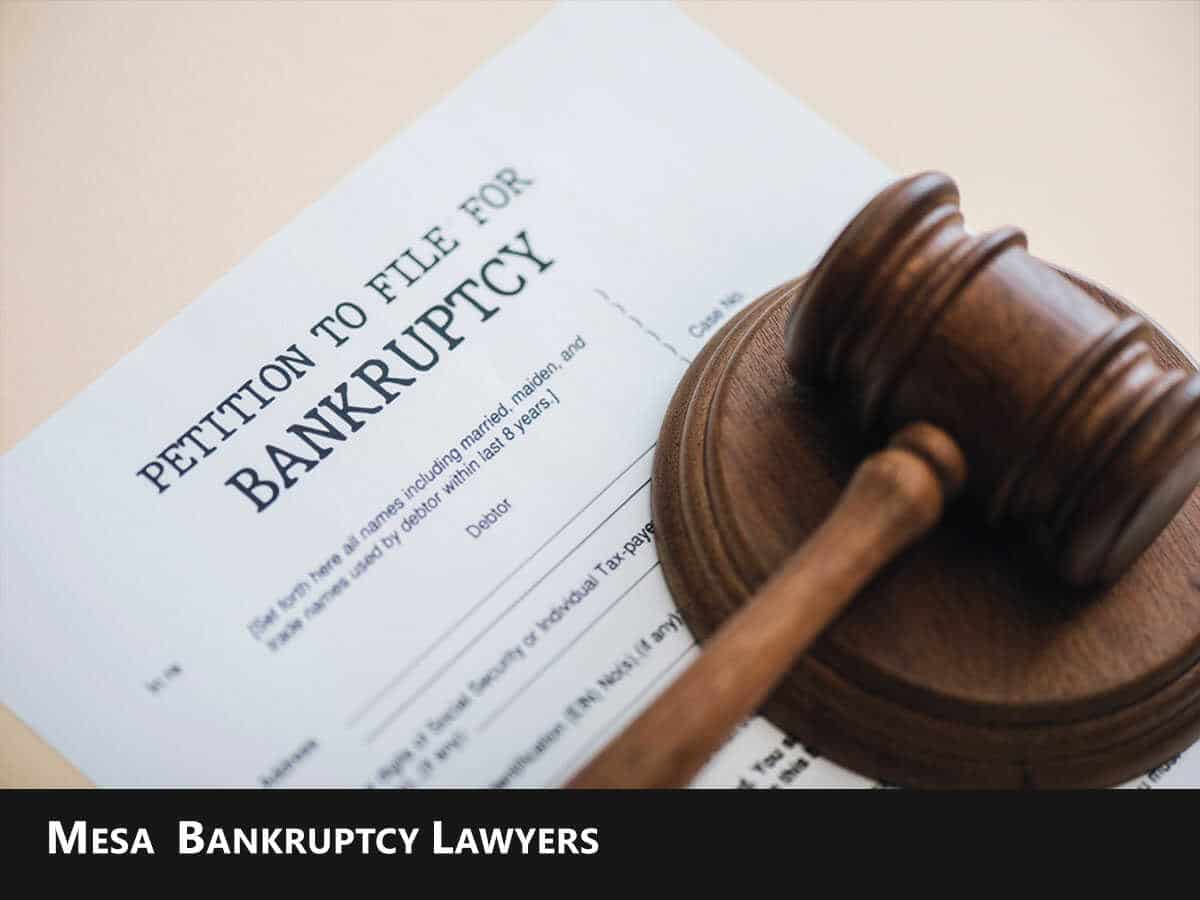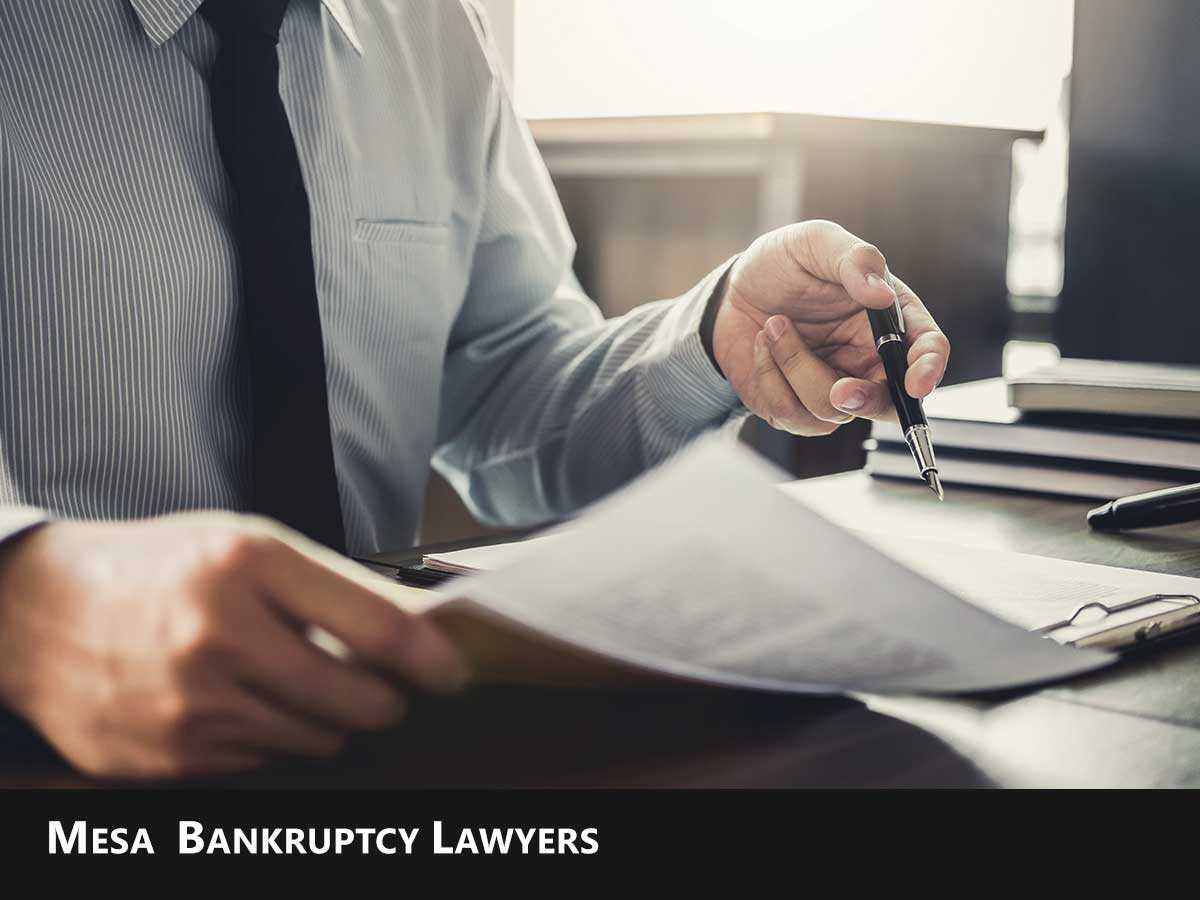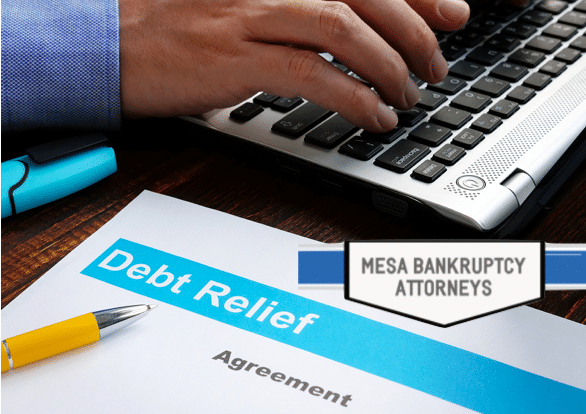Our Mesa Bankruptcy Attorneys Take You Step By Step Through The Process Of Filing a Chapter 7 Bankruptcy In Arizona
No matter how carefully you plan, debt is a problem that can happen to anyone in life. When it does, your creditors will eventually begin pursuing you for your debts. Your creditors may seek repayment through methods like wage garnishments, bank levies, vehicle repossessions, home foreclosures, and more. The good news is that bankruptcy can protect someone in this type of situation from their creditors, and address the underlying debt problem in the meantime. There are several types of bankruptcy, but the most common type of consumer bankruptcy in Arizona is Chapter 7. Read on to learn more about the steps to declare Chapter 7 bankruptcy and clear away debts. If you have additional questions, schedule your free consultation with our Mesa bankruptcy law firm.
Confirm That You Qualify For Chapter 7 Bankruptcy
Many people are unable to file Chapter 7 bankruptcy because their income is too high. The simplest way to qualify for Chapter 7 is by having less income than the median for your state. In Arizona, the median income for a family of 4 is currently $85,714. A family with a combined income of that amount or less automatically qualifies for Chapter 7. Otherwise, the debtor will need to qualify using the Means Test. This test shows the debtor can’t afford to pay off their debts after deducting mandatory expenses from their income. There are several other factors that could disqualify you from Chapter 7, or make filing it (as opposed to Chapter 13) inconvenient and burdensome. Consult with a Mesa bankruptcy attorney to confirm that chapters of bankruptcy for which you qualify.
Gather Your Documents & Information For Your Bankruptcy Petition
You will need several types of documents in order to draft your bankruptcy petition. These can range from bank account and credit card statements, to paystubs, to insurance policy statements, and more. If you retain a Mesa bankruptcy attorney, they will let you know which documents are necessary for your case. If not, determining which documents will be necessary- and then drafting your petition- will be your own responsibility.
Take Your First Credit Counseling Course
To discharge your debts through consumer bankruptcy, the Bankruptcy Code requires that you complete credit counseling courses. This is to help prevent bankruptcy filers from needing to file again in the future. You will need to complete one of these courses before your case is filed, and submit a course completion certificate with your petition. This course can be taken online, and can typically be completed in about an hour. You will also need to pay a nominal fee for credit counseling.
Sign & File Your Bankruptcy Petition
If you retain a bankruptcy attorney, they will schedule your petition signing once your petition is complete. Your attorney will review your petition with you to make sure everything is correct, and answer any questions you may have about your 341 Meeting of Creditors. If you file self-represented, you will draft, sign, and file your own petition. You may be required to file your petition in person at the courthouse. The filing fee for a Chapter 7 bankruptcy is currently $338. There are fee waivers available to those under financial hardship, but these typically won’t be granted if the filer has retained an attorney.
Respond To Your Trustee Letter
Approximately 10-15 days after your petition is filed, you will receive a letter from your bankruptcy trustee. The trustee is a court-appointed attorney who will oversee your case. After reviewing your petition, your trustee may have additional questions. You may be required to submit additional documentation to support your petition. This letter should also contain the date for your 341 Meeting of Creditors.
Attend Your 341 Meeting Of Creditors
This hearing is mandatory for those who declare both Chapter 7 and Chapter 13 bankruptcy. Make sure you bring your driver’s license and social security card to this hearing. Your case- and discharge of your debts- could be delayed for a failure to bring proper identification to your 341 Meeting of Creditors. You can bring a passport or other official photo identification in place of your driver’s license. If you don’t have your social security card, you must bring an original W-2 to your hearing. It will be held approximately 30-45 days from when you file your petition.
Your trustee will be at the hearing, and as the name suggests, your creditors may also be in attendance. Both may ask questions about your petition and debts. If you retain a bankruptcy attorney, they will be there with you to help you with your trustee’s and creditors’ questions. Otherwise, you will need to represent yourself at this hearing. However, this hearing is relatively short and simple compared to other court procedures. There may be several other cases on the docket at the same time as yours. If so, you and your attorney will wait for your case to be called during that time frame.
Take Your Second Credit Counseling Course
After your 341 Meeting of Creditors, you must complete a second online credit counseling course. It will take about as long and cost about as much as your first credit counseling course. You (or your attorney) will need to file the second course completion certificate with the court. This must be completed within 60 days of your 341 Meeting of Creditors.
Wait For Debt Discharge, Start Rebuilding Your Credit
If all the previous steps have been completed correctly, you will now wait for the court to discharge your case. Your case is eligible for discharge 60 days after your 341 Meeting of Creditors. It could take a few days or weeks longer than that for the court to process your discharge, depending on how busy the court is.
After you have received your discharge letter from the court, you are no longer liable for the debts in your bankruptcy. Whether or not your credit score increased or decreased (or stayed the same) upon filing, now it’s time to start rebuilding your credit. You will most likely receive new credit line offers in the mail after your case is discharged, but you can also open a secured credit card through your bank. Financing new assets, such as a vehicle, can help improve your score. Other installment payment plans- including our Zero Down Bankruptcy Payment Plan – will help improve your score as well.
Contact Our Mesa Chapter 7 Bankruptcy Attorneys For a Free consult
If you couldn’t already tell, retaining a bankruptcy attorney as early on in the process as possible will make it easier for you. However, the burden of paying for an attorney up front is impossible for some. That’s why our experienced Mesa bankruptcy attorneys offer Zero Down Bankruptcy for qualified Chapter 7 bankruptcy clients. To learn more, call or use our online form to schedule your free consultation today.
1731 West Baseline Rd., Suite #101
Mesa, AZ 85202
Office: (480) 448-9800







 If you are considering
If you are considering  For years, Chuck E. Cheese has been a favorite for children, especially for birthday parties. The chain features pizza and other kid-friendly fare, along with video games, prizes, and play equipment. Unfortunately, like many restaurants and other businesses, COVID-19 has decimated profits for the past few months and for the unforeseeable future. The Kid’s Birthday Party/Restaurant may have to file for bankruptcy protection.
For years, Chuck E. Cheese has been a favorite for children, especially for birthday parties. The chain features pizza and other kid-friendly fare, along with video games, prizes, and play equipment. Unfortunately, like many restaurants and other businesses, COVID-19 has decimated profits for the past few months and for the unforeseeable future. The Kid’s Birthday Party/Restaurant may have to file for bankruptcy protection. If the chain files bankruptcy, it will more than likely utilize Chapter 11. Chapter 11 can be used by individuals and by businesses, usually those with significant assets and debts that will be particularly complicated to reorganize. Chuck E. Cheese specified that it would be a Chapter 11 filing if the company does end up filing bankruptcy.
If the chain files bankruptcy, it will more than likely utilize Chapter 11. Chapter 11 can be used by individuals and by businesses, usually those with significant assets and debts that will be particularly complicated to reorganize. Chuck E. Cheese specified that it would be a Chapter 11 filing if the company does end up filing bankruptcy.



 ebt relief for people who have excessive debt, Chapter 7 bankruptcy is referred to as a “fresh start” bankruptcy or “liquidation” bankruptcy.
ebt relief for people who have excessive debt, Chapter 7 bankruptcy is referred to as a “fresh start” bankruptcy or “liquidation” bankruptcy.


